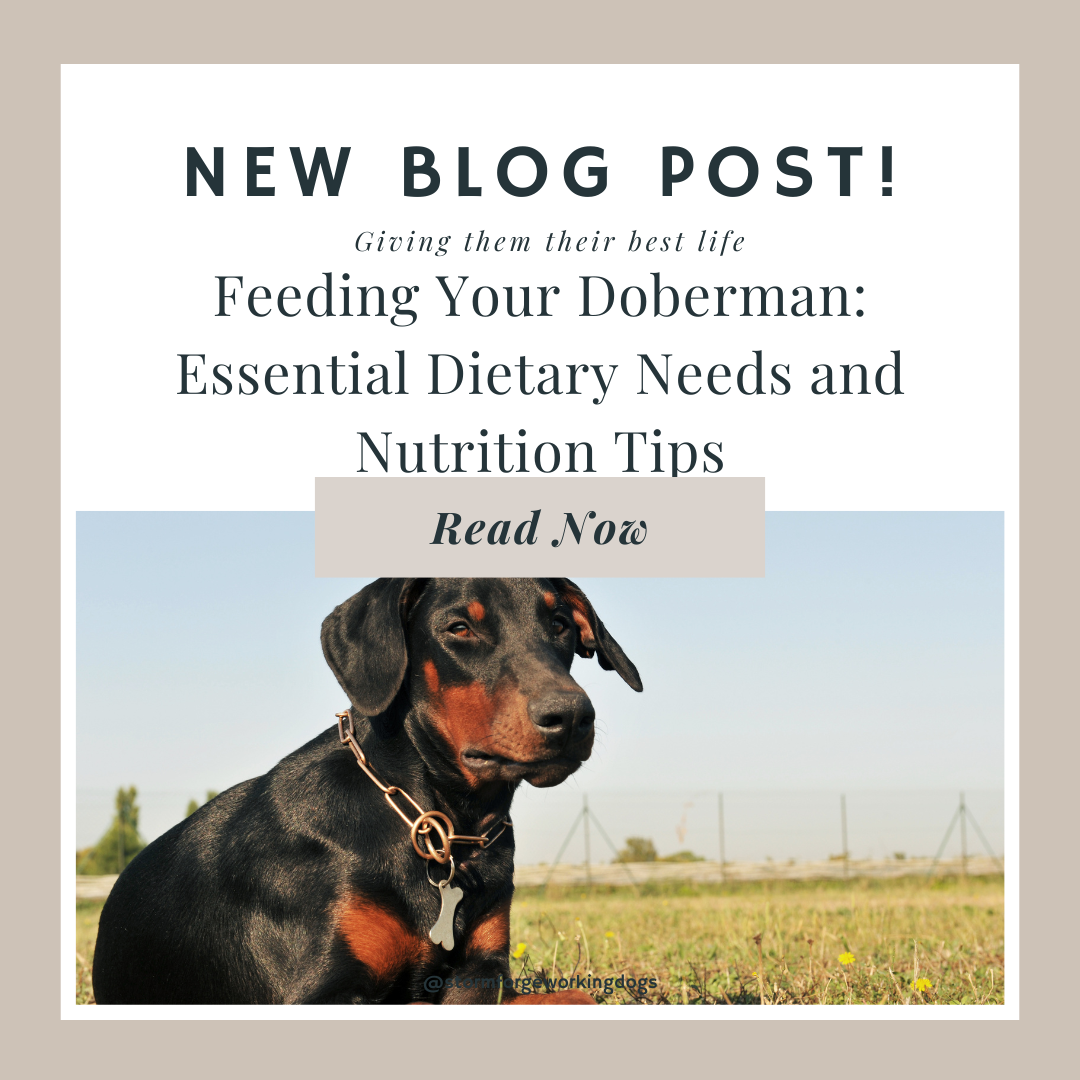Welcome back to the Stormforge Working Dogs blog! In our previous posts, we’ve explored various aspects of raising a happy and healthy Doberman, including socialization and exercise. Today, we’re focusing on another crucial component: your Doberman’s diet and nutrition. Understanding and meeting their dietary needs is essential for their health, vitality, and longevity.
Why Proper Nutrition is Vital
Proper nutrition plays a key role in your Doberman’s overall health and well-being. A balanced diet helps to:
- Support Growth and Development: Ensures proper bone, muscle, and organ development in puppies.
- Maintain Healthy Weight: Prevents obesity and related health issues by providing the right balance of nutrients.
- Boost Immune System: Strengthens the immune system, helping to ward off illnesses and infections.
- Enhance Coat and Skin Health: Promotes a shiny coat and healthy skin, reducing the risk of skin conditions.
- Provide Energy: Fuels your Doberman’s high energy levels, keeping them active and engaged.
Key Nutrients for Dobermans
Here are the essential nutrients that should be included in your Doberman’s diet:
1. Protein: Protein is crucial for muscle development, repair, and overall growth. High-quality sources of protein include chicken, beef, lamb, fish, and eggs. Aim for a diet that consists of at least 25-30% protein.
2. Fat: Fats provide a concentrated source of energy and support skin and coat health. Look for healthy fats from sources like fish oil, flaxseed oil, and chicken fat. Ensure the diet contains around 12-15% fat.
3. Carbohydrates: Carbohydrates supply energy and aid in digestion. Opt for complex carbohydrates like sweet potatoes, brown rice, and oats. Avoid fillers such as corn and wheat.
4. Vitamins and Minerals: Vitamins and minerals are essential for various bodily functions, including immune support, bone health, and metabolism. Include a variety of fruits and vegetables, such as carrots, spinach, and blueberries, to provide these nutrients.
5. Fiber: Fiber aids in digestion and helps maintain a healthy weight. Sources of fiber include pumpkin, sweet potatoes, and green beans.
6. Water: Always ensure your Doberman has access to fresh, clean water. Hydration is vital for all bodily functions and overall health.
Feeding Guidelines for Different Life Stages
1. Puppies: Puppies require a diet rich in protein and fat to support their rapid growth and development. Feed them high-quality puppy food formulated for large breeds. Follow the feeding guidelines on the packaging and adjust portions based on their growth and activity levels. Typically, puppies should be fed three to four times a day until they are about six months old.
2. Adults: Adult Dobermans need a balanced diet to maintain their energy levels and health. High-quality commercial dog food that meets AAFCO (Association of American Feed Control Officials) standards is a good choice. Feed them twice a day and monitor their weight to adjust portions as needed.
3. Seniors: Senior Dobermans may require a diet lower in calories and higher in fiber to prevent weight gain and support digestion. Look for senior dog food formulas that cater to their changing nutritional needs. Regularly consult your vet to ensure they’re getting the right nutrients.
Special Dietary Considerations
1. Allergies: Dobermans can be prone to food allergies. Common allergens include beef, chicken, dairy, and grains. If your dog shows signs of allergies such as itching, gastrointestinal issues, or ear infections, consult your vet. They may recommend an elimination diet or hypoallergenic food.
2. Raw Diets: Some owners prefer feeding their Dobermans a raw diet. If you choose this route, ensure the diet is balanced and consult with a veterinarian or a pet nutritionist to avoid deficiencies.
3. Supplements: While a balanced diet typically provides all necessary nutrients, some Dobermans may benefit from supplements, such as glucosamine for joint health or fish oil for skin and coat health. Always consult your vet before adding supplements to your dog’s diet.
Conclusion
Providing your Doberman with a balanced and nutritious diet is essential for their overall health and well-being. By understanding their dietary needs and offering high-quality food, you can ensure they lead a healthy and active life. Remember to adjust their diet based on their life stage and any special considerations, and always consult your vet for personalized advice.
Thank you for being part of the Stormforge Working Dogs community. Stay tuned for more insights and tips in our upcoming posts. If you have any questions or topics you’d like us to cover, feel free to reach out!
Warm regards,
The Stormforge Working Dogs Team
